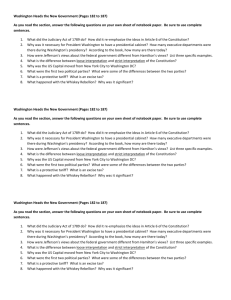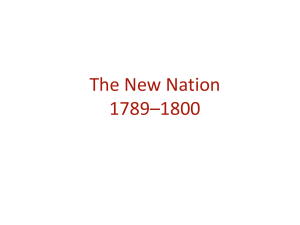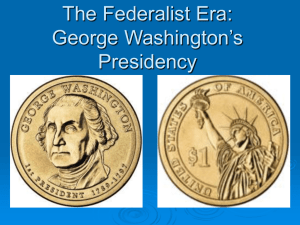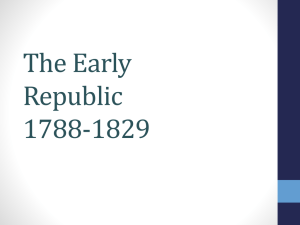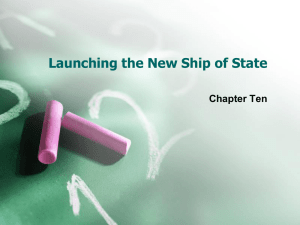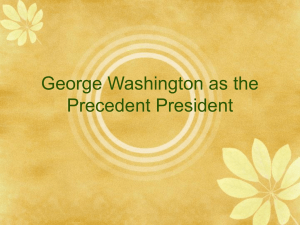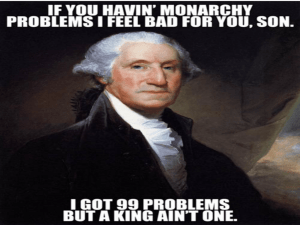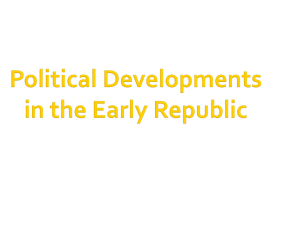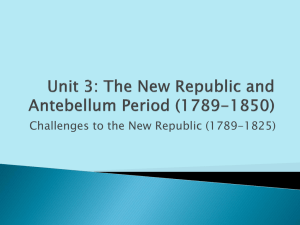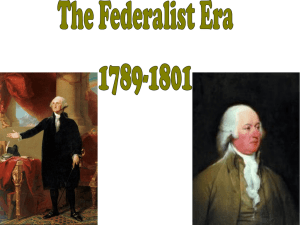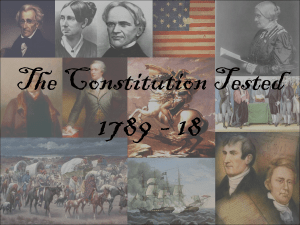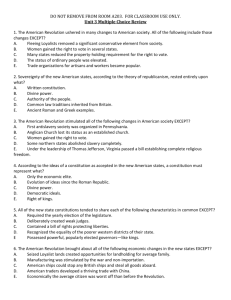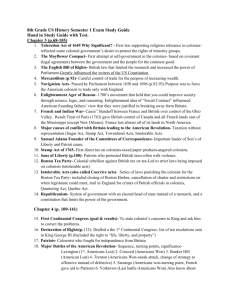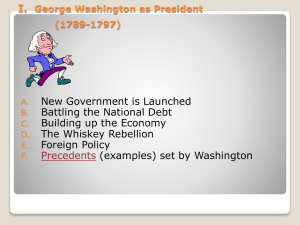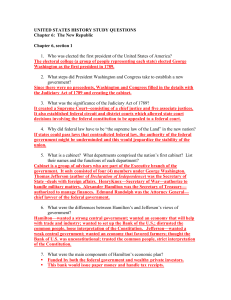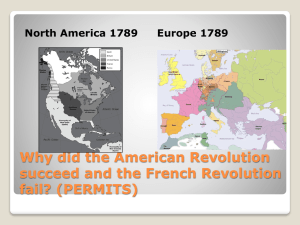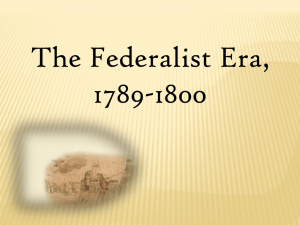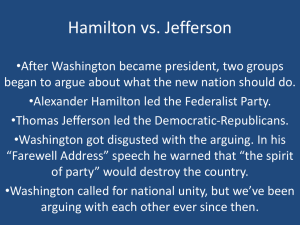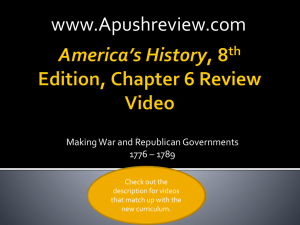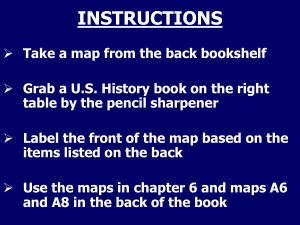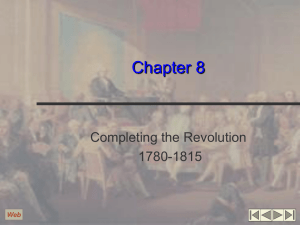Constitution and New Republic, 1776-1800
advertisement
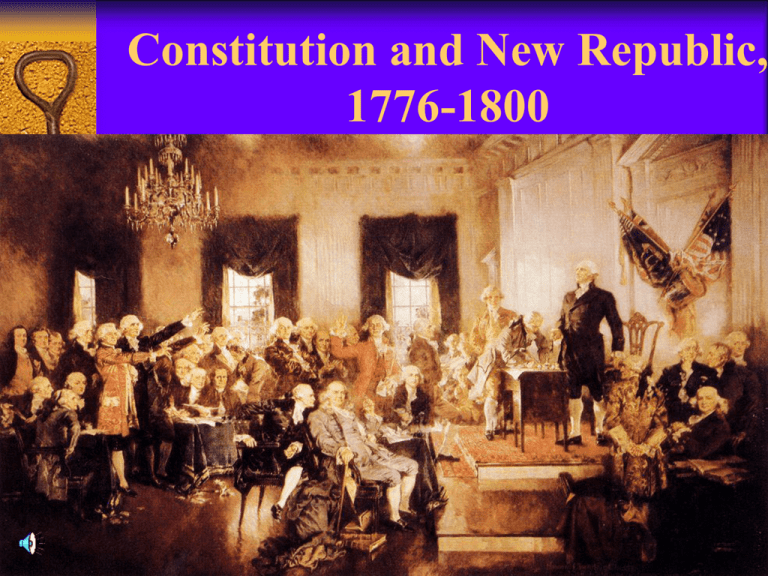
Constitution and New Republic, 1776-1800 Setting up the New Republic Presidential Cabinet, Court System, Finances, and Political Parties Washington takes the oath of office April 30, 1789 Federal Hall Washington Washington’s Presidency Received all electoral votes – Electors wrote down 2 names – Top winner became President, runner-up became Vice President Adams (Federalist) becomes VP Remained neutral in politics – Neutral: not taking a side Inaugurated on April 30, 1789 – Inaugurated: sworn in His every action was seen as a precedent since he was the first president – Precedent: an example Setting Up the Courts & Cabinet Constitution created the Supreme Court BUT left lots of decisions up to Congress – Federal Judiciary Act (1789) • 6 member court • Created lower federal courts Congress also had the job of creating departments to help the President run the U.S. – The heads of the departments became Washington’s cabinet – Washington was able to select the men who led each department Forming the First Cabinet Sec. of Treasury – Hamilton – Managed the country’s money Sec. of War – Knox – Oversaw the country’s defenses Sec. of State – Jefferson – Oversaw relations between the U.S. and other countries Constitution never mentioned a cabinet, but Wash set the precedent for the cabinet to advise the president Economic Problems War debt – Owed money to foreign countries, merchants, AND private citizens – More than 52 million dollars • About $1,291,836,000 today! (1.3 billion) – Government leaders saw it as a requirement for the U.S. to pay this money back • Wanted to maintain business relationship with those foreign countries • Also wanted to be able to borrow money in the future Hamilton’s Financial Program Tried to gain support of the elite Showed his belief in a strong central government – 1. Govt should pay public debt and state debt – 2. Revenue should be raised • Revenue: government income • Favored tariffs: taxes on imported goods – 3. Create a National Bank • Safe place to keep govt money • Would make loans • Issue paper money Washington supported his plan This plan would strengthen the national government worried Jefferson Beginnings of Political Parties Constitution does not mention parties Early disagreements over the creation of the new republic led to the creation of allies and enemies Writers of the Constitution had to make it general enough so that it would be flexible for the many different situations that would emerge This also led to disagreements over its meaning – Two camps emerge • Federalist • Anti-Federalist (Republican) Federalists Alexander Hamilton, James Madison, John Jay Thought a stronger, more centralized govt was needed Abandoned the ideas of the Articles of Confederation Feared chaos and the power of the people Anti-Federalists Jefferson was the leader Feared centralized power Trusted the will of the people Thought Constitution was too removed from the people Demanded a bill of rights Opposition to Hamilton’s Program Virginia (VA) and many other Southern states protests assuming state debts – They had already paid their debts – Did not like helping the North – Future capital is moved to D.C. as compromise National Bank – Created a debate over interpretation of Constitution • Loose (broad or flexible) vs. strict (narrow or limited) – Washington passed over protests of Jefferson and Madison – Bank established in 1791 Establishing Authority Whiskey Rebellion, Securing the Frontier, and Foreign Policy Whiskey Rebellion Conflict arose over the taxes from Hamilton’s plan Farmers refused to pay Whiskey Rebellion (1794) – Farmers in Pennsylvania beat up a tax collector – Others threatened to attack Pittsburg (the capitol) – Wash sent troops to control the rebels – Proved that the govt could AND would enforce the law Whiskey Rebellion Flag Securing the Frontier Northwest Territory was claimed by multiple nations – Spain, Britain, U.S., and Native Americans Spain threatened to close port of New Orleans – Worried Americans in the West who used it for trade Britain still held forts west of the Appalachian Mts. (violation of the Treaty of Paris of 1783) – Supported Native Americans in the area – Stirred up trouble between NAs and American settlers Battle of Fallen Timbers – Wash knew that the NW Territory was important to our security and growth – Sent troops to current day Michigan to defeats the NAs – NAs retreated and Britain refused to help • Did not want another war with U.S. – NA hopes of keeping their land were crushed French Revolution To Help France… Or Not... They aided us during the Britain was our biggest Revolution Treaty still bound U.S. and France together as allies Jefferson favored helping trading partner Britain was against France – Too risky to fight them again Hamilton favored not helping Washington decided that we would be neutral Congress passed a law forbidding aid to either side Jay’s Treaty Britain began seizing American ships and goods Chief Justice John Jay went to negotiate with Britain At the same time, news of our victory at Fallen Timbers arrived in Britain – They agreed to leave the Ohio Valley and pay us back for our stolen ships This helped reduce awkward tension between the U.S. and Britain Pinckney’s Treaty Also helped reduce tensions, but with Spain instead of Britain U.S. got the freedom to travel on the Mississippi and store goods at New Orleans without paying for it 31st parallel was also accepted as the new boundary of Florida Washington’s Farewell Although some opposed his policy of neutrality, he served as a symbol of national unity for 8 years (1789-1797) His farewell address provided advice and warnings for the country: – – – – – – Benefits of federal government Warns against political parties Importance of morality Stable credit Policy of neutrality Against over-powerful militaries
